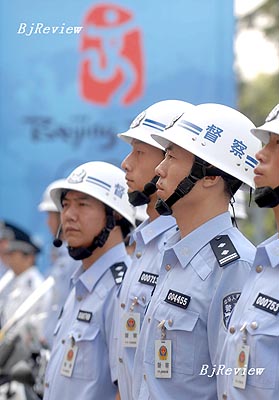|

"The Chinese Government and law enforcement organizations have the determination and capacity to ensure a 100 percent safe Olympics," said Zhou Yongkang, Minister of Public Security, at a recent international seminar on safety at the 2008 Olympic Games. The seminar was co-hosted by the Ministry of Public Security and the Beijing Organizing Committee for the Games of the XXIX Olympiad (BOCOG).
The major security threats to the Olympic Games come both from traditional and non-traditional arenas, including terrorists, separatists and extremists.
Security Strategy
"Beijing will have at least 80,000 guards on the streets during the Olympics, including the police force, private guards and security volunteers," said Ma Zhenchuan, chief of the Beijing Municipal Public Security Bureau. Ma said his agency will be in charge of coordinating the overall security strategy and will use government resources as necessary. He said the deployment of police officers at Olympic venues will be determined by real-time situations.
Policing the police officers will be a team of police supervisors, assuring officers do their jobs properly.
During the Good Luck Beijing serial Olympic test events, all safety measures were comprehensively tested under conditions that mimicked the Olympics.
The training of Olympic guards started as early as 2006. Last year's training was focused on basics while this year's training is focusing on dealing with emergencies. Real-life exercises will occupy preparation work from January to July next year. A simulation environment, similar to the artificial studios built for movie and film productions, will be built for the training of Olympic guards at that stage.
The police have been at the forefront of collecting information on the latest public security threats in China and abroad and analyzing all kinds of safety hazards to the Beijing Olympic Games.
"Our special police forces have been exercising hard to maintain their capacity to play a central role in safeguarding the Olympics," said Liu Shaowu, Director of the Security Department of BOCOG. He said a special police team will be the major force in fighting crime, violence and terrorism during the Olympics, and training standards are particularly strict for them.
It was announced in June that China's People's Liberation Army (PLA) had established a security unit, consisting of army, navy and air force personnel, for the Beijing Olympic Games. "It is international practice for military forces to participate in security for the Olympic Games," said Tian Yixiang, Director of the military bureau of the Beijing Olympic Games security work command center. He said while the ordinary maintenance of public security will be conducted by the police, private guards and volunteers, the PLA security unit will deal mainly with non-traditional threats, including biochemical and nuclear terror attacks. "The PLA unit will be responsible for the air protection of all arenas, and maritime safety of coastal venues. The unit will help the police and armed police forces to prevent and deal with terror attacks as well as with rescue operations," said Tian.
Ma said that a safe Olympic Games relies on the comprehensive safety preparations of the host city. "We must create a perfectly safe city to ensure the safety of the Olympics. Our preparation work will deal with every detail to maintain public order and ensure perfect public safety throughout the Games."
"Security forces serving the Olympics have compiled 52 outlines on security measures at Olympic venues, including fighting terrorism and collecting intelligence, and over 500 concrete implementation plans. These plans will be promoted and perfected," said Liu Jing, Vice Minister of Public Security. He said Beijing and five other co-host cities, Qingdao, Tianjin, Shanghai, Shenyang and Qinhuangdao, have set up command centers for security exercises. Hong Kong, the other co-host city, has also established security organizations specifically for the Olympics.
Intensifying international cooperation
"Hosting a safe Olympics requires broad international participation and close cooperation between different countries," said Zhou. He advocated that law enforcement agencies and international organizations should enhance cooperation in the following areas: increasing intelligence sharing, perfecting safety warning schemes, consolidating anti-terrorism international cooperation, learning useful experience from each other in handling emergencies and ensuring safety during the Olympic torch relay.
A major event support team along with state-of-the-art equipment will be dispatched by the International Criminal Police Organization (INTERPOL) to Beijing before the Games kick off in August next year, Ronald K. Noble, Secretary General of INTERPOL said on September 10 in Beijing.
The deployed team will provide detailed information on international criminal suspects, such as names, fingerprints, photographs and DNA profiles, according to Noble. INTERPOL will provide China with the organization's global criminal database with all the passport and visa information of criminal suspects, which will ensure that China can locate these people once they apply for Chinese visas.
Terrorists will not use their real names, they will use documents that were stolen or lost in order to conceal their identities. Therefore, INTERPOL has also planned to use its global database of stolen passports to help China detect fraudulent travel documents and terrorists more efficiently.
To improve the speed of searching the database, INTERPOL has also tailor-made a database of 15.7 million stolen passports for China, with which police forces can screen over 1,000 passports at one time. "This is the first time that INTERPOL has offered such a service to one country, creating a new opportunity for cooperation between the security forces of different countries," said Nobel.
He also said the around-the-clock command center of his organization would give the highest priority to information relevant to the security of the Games that passes through its 186-member country network of information.
|